much和many的区别
much和many的用法
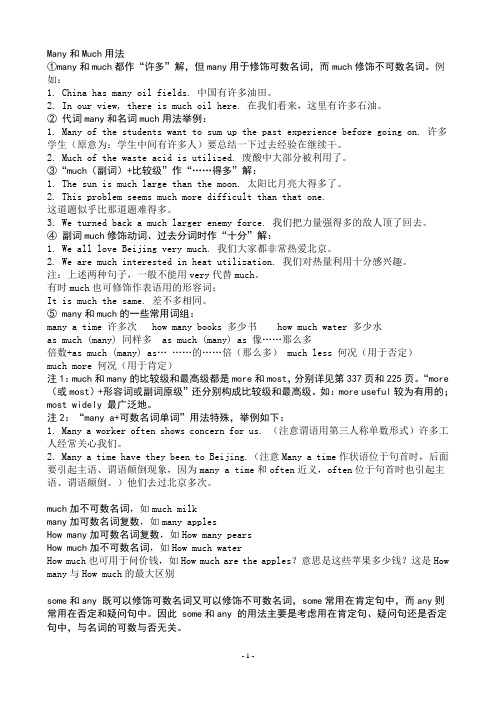
Many和Much用法①many和much都作“许多”解,但many用于修饰可数名词,而much修饰不可数名词。
例如:1. China has many oil fields. 中国有许多油田。
2. In our view, there is much oil here. 在我们看来,这里有许多石油。
②代词many和名词much用法举例:1. Many of the students want to sum up the past experience before going on. 许多学生(原意为:学生中间有许多人)要总结一下过去经验在继续干。
2. Much of the waste acid is utilized. 废酸中大部分被利用了。
③“much(副词)+比较级”作“……得多”解:1. The sun is much large than the moon. 太阳比月亮大得多了。
2. This problem seems much more difficult than that one.这道题似乎比那道题难得多。
3. We turned back a much larger enemy force. 我们把力量强得多的敌人顶了回去。
④副词much修饰动词、过去分词时作“十分”解:1. We all love Beijing very much. 我们大家都非常热爱北京。
2. We are much interested in heat utilization. 我们对热量利用十分感兴趣。
注:上述两种句子,一般不能用very代替much。
有时much也可修饰作表语用的形容词:It is much the same. 差不多相同。
⑤ many和much的一些常用词组:many a time 许多次 how many books 多少书 how much water 多少水as much (many) 同样多 as much (many) as 像……那么多倍数+as much (many) as………的……倍(那么多) much less 何况(用于否定)much more 何况(用于肯定)注1:much和many的比较级和最高级都是more和most,分别详见第337页和225页。
much和many的用法

Many和Much用法之迟辟智美创作①many和much都作“许多”解,但many用于修饰可数名词,而much修饰不成数名词.例如:1. China has many oil fields. 中国有许多油田.2. In our view, there is much oil here. 在我们看来,这里有许多石油.②代词many和名词much用法举例:1. Many of the students want to sum up the past experience before going on. 许多学生(原意为:学生中间有许多人)要总结一下过去经验在继续干.2. Much of the waste acid is utilized. 废酸中年夜部份被利用了.③“much(副词)+比力级”作“……很多”解:1. The sun is much large than the moon. 太阳比月亮年夜很多了.2. This problem seems much more difficult than that one.这道题似乎比那道题难很多.3. We turned back a much larger enemy force. 我们把力量强很多的仇敌顶了回去.④副词much修饰动词、过去分词时作“十分”解:1. We all love Beijing very much. 我们年夜家都非常热爱北京.2. We are much interested in heat utilization. 我们对热量利用十分感兴趣.注:上述两种句子,一般不能用very取代much.有时much也可修饰作表语用的形容词:It is much the same. 差未几相同.⑤many和much的一些经常使用词组:many a time 许屡次how many books 几多书how much water 几多水as much (many) 同样多as much (many) as 像……那么多倍数+as much (many) as………的……倍(那么多)much less 何况(用于否定)much more 何况(用于肯定)注1:much和many的比力级和最高级都是more和most,分别详见第337页和225页.“more(或most)+形容词或副词原级”还分别构成比力级和最高级.如:more useful较为有用的;most widely 最广泛地.注2:“many a+可数名词单词”用法特殊,举例如下:1. Many a worker often shows concern for us. (注意谓语用第三人称双数形式)许多工人经常关心我们.2. Many a time have they been to Beijing.(注意Many a time作状语位于句首时,后面要引起主语、谓语倒置现象,因为many a time和often近义,often位于句首时也引起主语、谓语倒置.)他们去过北京屡次.much加不成数名词,如much milkmany加可数名词复数,如many applesHow many加可数名词复数,如How many pearsHow much加不成数名词,如How much waterHow much也可用于问价钱,如How much are the apples?意思是这些苹果几多钱?这是How many与How much的最年夜区别some和any 既可以修饰可数名词又可以修饰不成数名词,some经常使用在肯定句中,而any则经常使用在否定和疑问句中.因此 some和any 的用法主要是考虑用在肯定句、疑问句还是否定句中,与名词的可数与否无关.some意为“一些”,可作形容词和代词.它常修饰可数名词复数.如:some books一些书,some boys一些男孩,也可修饰不成数名词,如:some water一些水,some tea一些茶叶,some经常使用在肯定句中.any意为“任何一些”,它也可修饰可数名词复数或不成数名词,经常使用于疑问句和否定句.如:--I have some tea here. 我这儿有些茶叶.--I can’t see any tea. 我没看见茶叶.--Do you have any friends at school? 你在学校有些朋友吗?--I have some English books, they are my best friends. 我有英语书,它们是我最好的朋友.但在暗示建议,反问,请求的疑问句中,或期望获得肯定回答时,多用some而不用any.如: Would you like some coffee? 你要不要来点咖啡?What about some fruit juice? 来点水果汁如何?当any暗示“任何”的意义,起强调作用时,它可以用在肯定句中;Any student can answer this question.任何学生都可以回答这个问题.选题角度:辨析some和any的分歧用法:some 经常使用在肯定句中,而any 则经常使用在否定和疑问句中.在暗示建议,反问,请求的疑问句中,或期望获得肯定回答时,多用some而不用any.lot、lots、a lot、a lots、lot of、lots of、a lot of、a lots of的区别——相当,许多——土堆3.a lot的用法a lot是口语中的一个经常使用词组,多用于肯定句,有时也用于疑问句.其主要用法有如下几点:①作名词短语,暗示“很多;多量”,在句中作主语、宾语或表语,其后常有动词不定式短语作后置定语,如:There is a lot to see at the party.聚会上有许多可观赏的工具.(作主语)You know a lot/much about English names.你知道许多有关英语姓名的情况.(作宾语)This is a lot.这真多.(作表语)②作副词短语,在句中作水平状语,暗示“很;非常;经常”,修饰动词、感叹词、介词短语、形容词或副词的比力级,如:It usually rains a lot/much at this time of year.每年这个时候都经常下雨.(修饰动词rain)Thanks a lot/very much ---that’s very kind.多谢,十分感激.(修饰感叹词thanks,thanks=thank you)He is feeling a lot/much better.他感觉好多了.(修饰比力级better)③a lot前可被such,what,quite,rather修饰,如:I like him quite a lot. 我非常喜欢他.---How much money is left?---还剩下几多钱?---Rather a lot.---还有相当多.4.a lot of = lots of,可修饰可数或不成数名词,意为“许多”,“年夜量的”,相当于many或much.a lot, a lot of, lots of通经常使用于肯定句,否定句中一般用many或much,如:There’s a lot of work to do and a lot of people have been sent there.有许多事情要做,许多人已派去那里了.5.用于固定搭配构成习语.have a lot to answer for为糟糕的情况负责have a lot on your plate有很多困难的工作要处置have a lot on/have a lot going on 近期很忙Do you have a lot on for tonight? 你今晚很忙吗?They will have a lot on tomorrow. 他们明天将很忙.have a lot on one’s mind把很多事情挂在心上see + n. (a lot/little/less/more/much/nothing/something) + of +sb./sth. ……见到某人/物He has seen something of life. 他略有阅历.We hope to see something of you during the holidays. 我们希望在假期里不时能看到你.something of…暗示“几分;几多”lots 不独自用的,lots of=a lot of 后面接可数名词和不成数名词均可,接可数名词时谓语用复数,接不成数名词时,谓语用双数.a lot 固然不是名词性短语了,而是副词性短语,修饰动词.比如:Thanks a lot.= Thanks very much.再比如:I know him a lot.plenty of 和以上lots of 和a lot of相似,后面接可数名词和不成数名词均可,接可数名词时谓语用复数,接不成数名词时,谓语用双数.。
much和many的区别

much和many的区别
much[mʌtʃ] 和many [ˈmεnɪ] 这两个单词是我们在英语的学习过程中比较常见的两个词,它们的意思都是表示很多,但是在用法上,两个词还是有很多区别的。
many用来修饰复数可数名词,表示许多的意思。
任何超过一个的,都称为many。
当many用在肯定句中,它意味着一个大数并且可以计算的东西,而当它用在否定句中,它指的是很少的东西。
例:
1.Not many people are going to the procession.
(参加游行的人不多。
)
2.There is much water in the pot.
(锅里有很多水。
)
much用来修饰不可数名词,表示量或是程度。
它是一个量词,我们在句子中使用much这个词时,后面跟不可数名词。
当much用在肯定句,它的意思是很多,而当它用在否定句,它的意思是一点点、少量。
much可以用在形容词、副词的比较级之前,但是many不可以。
例:
1.I don't want much rice. (我不想要太多米饭。
)
2.How much time do we have? (我们有多少时间?)。
much和many的区别及用法

much和many的区别及用法
两者都表示“许多”,但many 修饰或代替可数名词(复数),与few(少数)相对;而much 用来修饰或代替不可数名词(单数),与little(少量)相对。
1much 和many 的区别是什幺1. 两者都表示“许多”,但many 修饰或代替
可数名词(复数),与few(少数)相对;而much 用来修饰或代替不可数名词(单数),与little(少量)相对。
如:
Did you see many people there?
你在那儿看见许多人了吗?
Many poets have died young.
许多诗人很年轻就死了。
Do you have much money left?
你剩的钱多吗?
He doesn’t spend much time preparing his lessons.
他备课不花太多时间。
2. 关于many of 和much of:
(1) 其后接名词时,该名词通常应是特指的(比如有the, these, those, my, our, Tom’s等修饰)。
如:
Many of the farmers grow rice.
很多农民种稻子。
much和many的用法
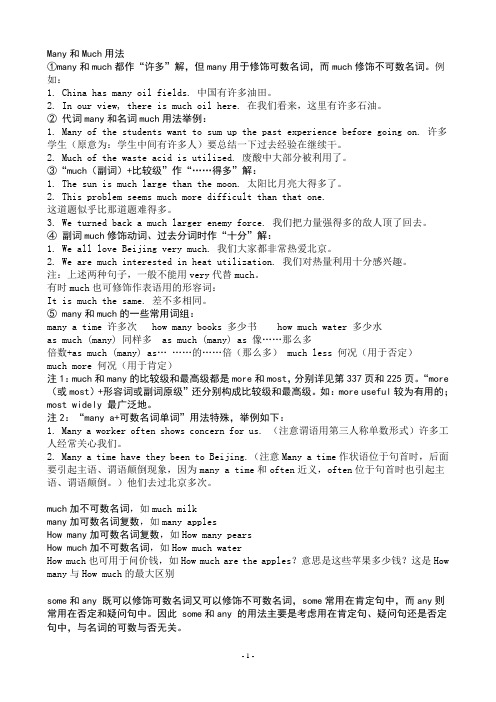
Many和Much用法①many和much都作“许多”解,但many用于修饰可数名词,而much修饰不可数名词。
例如:1. China has many oil fields. 中国有许多油田。
2. In our view, there is much oil here. 在我们看来,这里有许多石油。
②代词many和名词much用法举例:1. Many of the students want to sum up the past experience before going on. 许多学生(原意为:学生中间有许多人)要总结一下过去经验在继续干。
2. Much of the waste acid is utilized. 废酸中大部分被利用了。
③“much(副词)+比较级”作“……得多”解:1. The sun is much large than the moon. 太阳比月亮大得多了。
2. This problem seems much more difficult than that one.这道题似乎比那道题难得多。
3. We turned back a much larger enemy force. 我们把力量强得多的敌人顶了回去。
④副词much修饰动词、过去分词时作“十分”解:1. We all love Beijing very much. 我们大家都非常热爱北京。
2. We are much interested in heat utilization. 我们对热量利用十分感兴趣。
注:上述两种句子,一般不能用very代替much。
有时much也可修饰作表语用的形容词:It is much the same. 差不多相同。
⑤ many和much的一些常用词组:many a time 许多次 how many books 多少书 how much water 多少水as much (many) 同样多 as much (many) as 像……那么多倍数+as much (many) as………的……倍(那么多) much less 何况(用于否定)much more 何况(用于肯定)注1:much和many的比较级和最高级都是more和most,分别详见第337页和225页。
much和many的用法
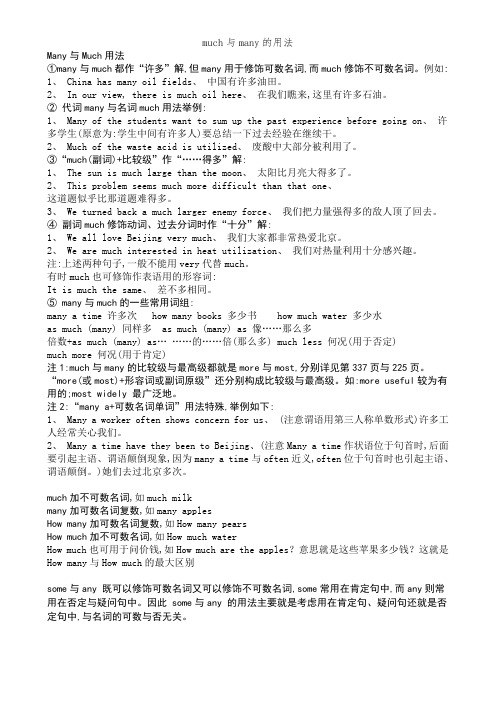
Many与Much用法①many与much都作“许多”解,但many用于修饰可数名词,而much修饰不可数名词。
例如:1、 China has many oil fields、中国有许多油田。
2、 In our view, there is much oil here、在我们瞧来,这里有许多石油。
②代词many与名词much用法举例:1、 Many of the students want to sum up the past experience before going on、许多学生(原意为:学生中间有许多人)要总结一下过去经验在继续干。
2、 Much of the waste acid is utilized、废酸中大部分被利用了。
③“much(副词)+比较级”作“……得多”解:1、 The sun is much large than the moon、太阳比月亮大得多了。
2、 This problem seems much more difficult than that one、这道题似乎比那道题难得多。
3、 We turned back a much larger enemy force、我们把力量强得多的敌人顶了回去。
④副词much修饰动词、过去分词时作“十分”解:1、 We all love Beijing very much、我们大家都非常热爱北京。
2、 We are much interested in heat utilization、我们对热量利用十分感兴趣。
注:上述两种句子,一般不能用very代替much。
有时much也可修饰作表语用的形容词:It is much the same、差不多相同。
⑤ many与much的一些常用词组:many a time 许多次 how many books 多少书 how much water 多少水as much (many) 同样多 as much (many) as 像……那么多倍数+as much (many) as………的……倍(那么多) much less 何况(用于否定)much more 何况(用于肯定)注1:much与many的比较级与最高级都就是more与most,分别详见第337页与225页。
many,much的用法
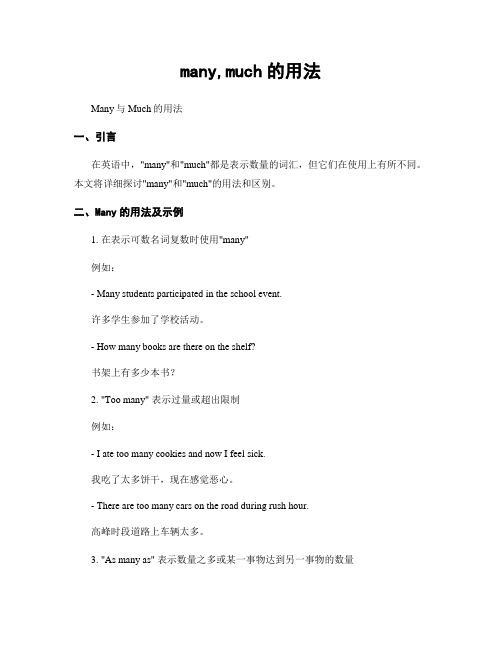
many,much的用法Many与Much的用法一、引言在英语中,"many"和"much"都是表示数量的词汇,但它们在使用上有所不同。
本文将详细探讨"many"和"much"的用法和区别。
二、Many的用法及示例1. 在表示可数名词复数时使用"many"例如:- Many students participated in the school event.许多学生参加了学校活动。
- How many books are there on the shelf?书架上有多少本书?2. "Too many" 表示过量或超出限制例如:- I ate too many cookies and now I feel sick.我吃了太多饼干,现在感觉恶心。
- There are too many cars on the road during rush hour.高峰时段道路上车辆太多。
3. "As many as" 表示数量之多或某一事物达到另一事物的数量例如:- She has visited as many as ten countries in the past year.她去年访问了整整十个国家。
- He has as many toys as his brother.他有和他兄弟一样多的玩具。
4. "Not that many" 表示数量不够或不足够例如:- There aren't that many apples left in the basket.篮子里剩下的苹果并不是很多。
- Not that many people showed up for the meeting yesterday.昨天出席会议的人并不是很多。
三、Much的用法及示例1. 在表示不可数名词时使用"much"例如:- She doesn't have much time to study.她没有太多时间来学习。
many,a lot of, much的区别

六年级英语毕业总复习School:Class:Name:many,a lot of, much的区别many,a lot of, much,这三个词都是表示“许多”。
many是用来修饰可数名词,much用来修饰不可数名词,a lot of则可以用来修饰可数与不可数名词。
如:Peter has many friends.(可数名词的前面)Peter has much food for his birthday party.(不可数名词的前面)Peter has a lot of friends.( 可数名词的前面)Peter has a lot of food for his birthday party. (不可数名词的前面)many, much, (a) little, (a) few的区别用法:(1)多用作定语many pupils few books a few shirtsmuch money little support a little sugar(2)有时也作主语、宾语、表语如:A few of us are from the south. (主语)Few (of us) have ever been to Tibet. (主语) (我们中间)很少人到过西藏。
There is still much to be done. (主语)I know little (don’t know much) about it. (宾语)You’re many, and they are few. (表语) 你们是多数,他们是少数。
(3)much 有时也作状语如:H likes playing football very much.(4)quite a few: 相当多、许多,修饰或代替可数名词复数如:There were quite a few foreigners there.1。
much和many的区别
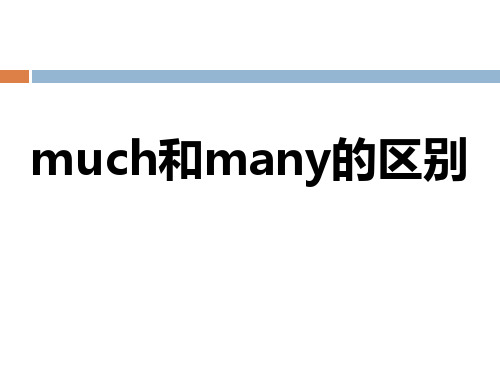
教材典据
1.都是数量的不定代词。 2.意思是“许多”、“大量”。 3.在句中,既可以充当名词,也可以充当形容词。 4any修饰或代替可数名词,如many books.
6.much修饰或代替不可数名词,如much water.
7.much可以修饰动词,many不行。 eg. She eats too much.她吃得太多了。 8.much可以修饰比较级,many不行。 eg. He's much taller than her.他比她高得多。
11.many、much前可有as、so、too、how等进行 修饰。
12.the、these、those可以修饰many. the、this、that可以修饰much.
语法探究
9.many作主语时,谓语动词用复数。 eg. Many students are 15 years old. much作主语时,谓语动词用单数。 eg. Much water is clean.
10.名词前若有the、my、your、our、their、 this、that、it、these、those等。不能直接用 many或much,要用many of或much of. eg. Many of them are students. eg. Much of the information is good for us.
much和many的用法
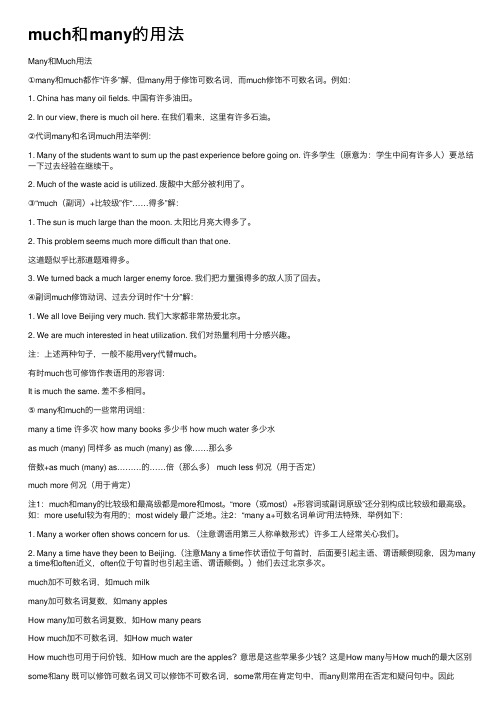
much和many的⽤法Many和Much⽤法①many和much都作“许多”解,但many⽤于修饰可数名词,⽽much修饰不可数名词。
例如:1. China has many oil fields. 中国有许多油⽥。
2. In our view, there is much oil here. 在我们看来,这⾥有许多⽯油。
②代词many和名词much⽤法举例:1. Many of the students want to sum up the past experience before going on. 许多学⽣(原意为:学⽣中间有许多⼈)要总结⼀下过去经验在继续⼲。
2. Much of the waste acid is utilized. 废酸中⼤部分被利⽤了。
③“much(副词)+⽐较级”作“……得多”解:1. The sun is much large than the moon. 太阳⽐⽉亮⼤得多了。
2. This problem seems much more difficult than that one.这道题似乎⽐那道题难得多。
3. We turned back a much larger enemy force. 我们把⼒量强得多的敌⼈顶了回去。
④副词much修饰动词、过去分词时作“⼗分”解:1. We all love Beijing very much. 我们⼤家都⾮常热爱北京。
2. We are much interested in heat utilization. 我们对热量利⽤⼗分感兴趣。
注:上述两种句⼦,⼀般不能⽤very代替much。
有时much也可修饰作表语⽤的形容词:It is much the same. 差不多相同。
⑤ many和much的⼀些常⽤词组:many a time 许多次 how many books 多少书 how much water 多少⽔as much (many) 同样多 as much (many) as 像……那么多倍数+as much (many) as………的……倍(那么多) much less 何况(⽤于否定)much more 何况(⽤于肯定)注1:much和many的⽐较级和最⾼级都是more和most。
(完整word)much和many的用法
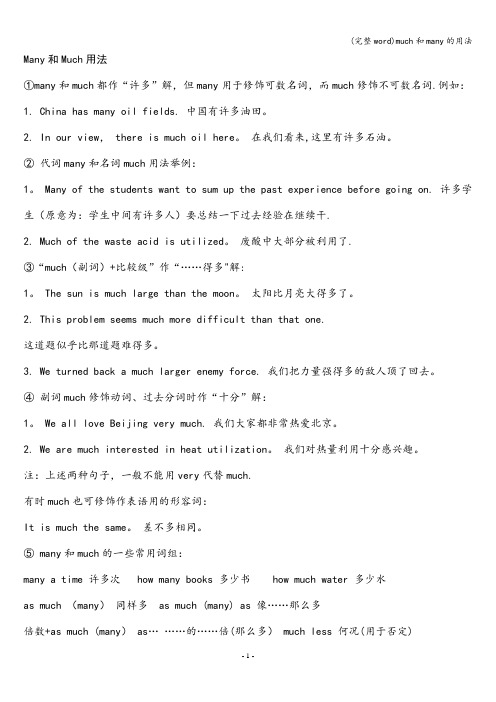
Many和Much用法①many和much都作“许多”解,但many用于修饰可数名词,而much修饰不可数名词.例如:1. China has many oil fields. 中国有许多油田。
2. In our view, there is much oil here。
在我们看来,这里有许多石油。
②代词many和名词much用法举例:1。
Many of the students want to sum up the past experience before going on. 许多学生(原意为:学生中间有许多人)要总结一下过去经验在继续干.2. Much of the waste acid is utilized。
废酸中大部分被利用了.③“much(副词)+比较级”作“……得多"解:1。
The sun is much large than the moon。
太阳比月亮大得多了。
2. This problem seems much more difficult than that one.这道题似乎比那道题难得多。
3. We turned back a much larger enemy force. 我们把力量强得多的敌人顶了回去。
④副词much修饰动词、过去分词时作“十分”解:1。
We all love Beijing very much. 我们大家都非常热爱北京。
2. We are much interested in heat utilization。
我们对热量利用十分感兴趣。
注:上述两种句子,一般不能用very代替much.有时much也可修饰作表语用的形容词:It is much the same。
差不多相同。
⑤ many和much的一些常用词组:many a time 许多次 how many books 多少书 how much water 多少水as much (many)同样多 as much (many) as 像……那么多倍数+as much (many) as………的……倍(那么多) much less 何况(用于否定)much more 何况(用于肯定)注1:much和many的比较级和最高级都是more和most,分别详见第337页和225页。
much和many怎么区分
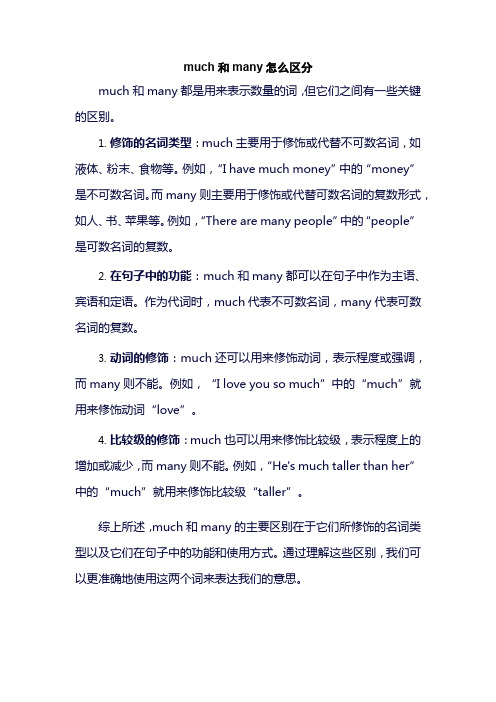
much和many怎么区分
much和many都是用来表示数量的词,但它们之间有一些关键的区别。
1.修饰的名词类型:much主要用于修饰或代替不可数名词,如液体、粉末、食物等。
例如,“I have much money”中的“money”是不可数名词。
而many则主要用于修饰或代替可数名词的复数形式,如人、书、苹果等。
例如,“There are many people”中的“people”是可数名词的复数。
2.在句子中的功能:much和many都可以在句子中作为主语、宾语和定语。
作为代词时,much代表不可数名词,many代表可数名词的复数。
3.动词的修饰:much还可以用来修饰动词,表示程度或强调,而many则不能。
例如,“I love you so much”中的“much”就用来修饰动词“love”。
4.比较级的修饰:much也可以用来修饰比较级,表示程度上的增加或减少,而many则不能。
例如,“He's much taller than her”中的“much”就用来修饰比较级“taller”。
综上所述,much和many的主要区别在于它们所修饰的名词类型以及它们在句子中的功能和使用方式。
通过理解这些区别,我们可以更准确地使用这两个词来表达我们的意思。
many much的用法和区别

Many much 的用法和区别1.Many 和much 都可以做形容词,表示“数量上的”“许多,很多”的含义。
(1)many 修饰可数名词,表示“许多,很多”,如:Many college students are having many books to read, many recreations to experience, and many roads to take.很多大学生要读很多的书,可以体验很多娱乐项目,有很多的路要走。
( book, recreation, road 都是可数名词)(2)Much 修饰不可数名词,表示“许多,很多”,如:Countryside is attracting citizens with much fresh air, much fresh water, much kindness, and much warmness.乡村以大量的新鲜空气,洁净的水,善良和温暖吸引着城里的人。
(air, water, kindness, warmness, 这些都是不可数名词。
因为人们通常不会说一个空气,两个水,或者一个善良,两个温暖这样的话语)2.Much 可以做副词,表示“程度上地”“很,多,深”的含义最简单的例子:I love you very much. (much 表示程度上的“很,深”,我很爱你)Much deep in my heart, much hidden in my brain, a much dreamed girl there it is, untold to anyone.在我心底深处,很好地藏在大脑里,有一个梦中地女孩,我不会告诉任何一个人。
3.Many 和Much都可以做代词,代指相应地可数名词和不可数名词。
如,Many of the cars are luxury ones. (车,很多都是豪华车,many 指代车)Yangtze river flows into the sea, much of water has been used along the way. (长江流向大海,很多水途中被人们用掉了,much 指代长江水)。
22年中考英语语法复习 Much,many辨析
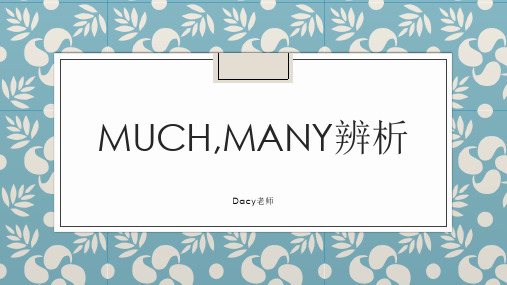
EXIT
Thank you
◦ 一、意思不同 ◦ 1.many意思:n. 许多;许多人或物 ◦ 2.much意思:n. 许多
◦ 二、侧重点不同 ◦ 1.many侧重点:用于一般现在时。 ◦ 2.much侧重点:用于一般现在时或一般将来时。
many和much区别
◦ 三、用法不同 ◦ 1.many用法: ◦ 用作定语,只有在对比结构中,可用作表语,往往含有“虽然多”或“确实多”的意思。 ◦ 例句:Many of these substances are innocuous.这里的许多物质都无害。
much many
NEXT
2/10
You don't have _m__u__c_h__ time to do this test.
much many
NEXT
3/10
Greg doesn't have ___m_a__n_y__ friends.
much many
NEXT
4/10
He doesn't read _m__a_n__y__ newspapers.
◦ 1、它可以与名词一起用作限定词: ◦ There are not many teachers in this school.(这所学校教师不多。) ◦ 2、它可以用作代词: ◦ Many think Twitter is more popular than Facebook.(很多人认为Twitter比Facebook更受欢迎。)
“chapters(章节)”连用,后者是可数名词。 ◦ 同样地,在第二句中,“much”与“money(钱)”一起使用,它又是一个不可数名词,因为你
不能把它算作“one money”、“two money”等。 ◦ 此外,在第二句中,“many”与“dollars(美元)”一起使用,而“dollars”可以算作“money”
